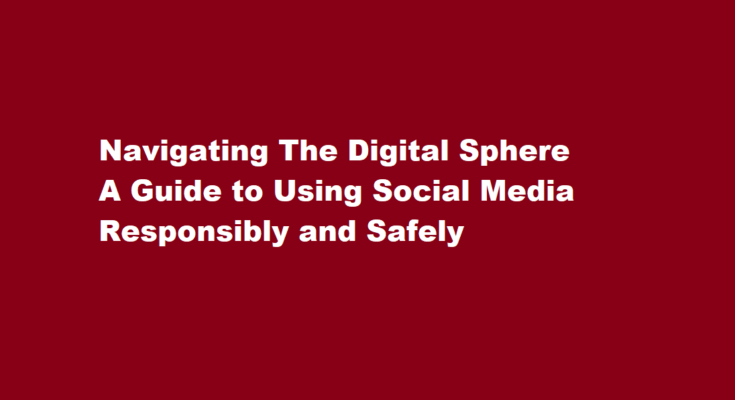Introduction
Social media has become an integral part of our lives, connecting us with friends, family, and the world at large. However, its extensive reach and potential impact require us to use it responsibly and safely. With cyber threats, misinformation, and privacy concerns on the rise, it is crucial to understand how to navigate the digital sphere with caution. This article aims to provide a comprehensive guide on how to use social media responsibly, fostering a positive online environment while safeguarding our personal data and mental well-being.
Educate Yourself
Before delving into the world of social media, take the time to educate yourself about the various platforms and their privacy settings. Familiarize yourself with the terms of service, community guidelines, and reporting mechanisms. Understand the consequences of oversharing personal information and the potential for misuse. Additionally, stay updated on current cyber threats, scams, and the latest trends in online safety. Armed with knowledge, you can make informed decisions and protect yourself from potential pitfalls.
Think Before You Post
As the saying goes, “once it’s on the internet, it’s there forever.” Before posting anything, consider the potential ramifications. Ask yourself if the content aligns with your values, whether it could be misinterpreted, or if it might hurt others. Refrain from posting or sharing sensitive information such as your address, phone number, or financial details. Remember, maintaining a positive online reputation is vital, as employers and others often review social media profiles.
Verify Information
Misinformation spreads rapidly on social media, impacting public opinion and decision-making. Always verify the authenticity of the information before sharing or acting upon it. Rely on credible sources and fact-checking websites to ensure accuracy. Avoid perpetuating false narratives, as this can contribute to a climate of uncertainty and fear.
Be Mindful of Privacy
Protecting your privacy is paramount in the digital age. Adjust your privacy settings to control who can view your posts and personal information. Be cautious about accepting friend requests or connections from unknown individuals. Regularly review and update your privacy settings to adapt to platform changes. Furthermore, be aware of third-party apps that may access your data through your social media accounts. Minimizing the personal information you share online reduces the risk of identity theft and other privacy breaches.
Engage Respectfully
Social media provides a platform for open dialogue and healthy debates. However, disagreements can escalate quickly, leading to online harassment and negativity. Engage in discussions respectfully, without resorting to personal attacks. Practice empathy and understanding, as there are real people behind the profiles. If you encounter harmful behavior, report it instead of retaliating. Being mindful of your own online conduct can foster a more positive and constructive digital community.
Manage Screen Time
Excessive social media use can lead to negative effects on mental health, such as anxiety and depression. Set boundaries for yourself and limit your screen time. Schedule regular digital detoxes to disconnect from social media and reconnect with the physical world. Utilize productivity apps that track and manage your screen time, promoting a healthier balance between your online and offline life.
FREQUENTLY ASKED QUESTIONS
Why is it important to know how to use social media responsibly?
In addition, social media can also be used to incite violence or spread hate speech, leading to more conflict and division. It is, therefore, essential to use social media responsibly and critically during times of crisis.
What is social media responsibility?
You are 100 percent responsible for everything that appears on your social media accounts, from your status updates and comments to pictures, videos, and links you share. Here are some tips for staying on top of your personal and professional responsibilities in today’s social age.
Conclusion
Social media, when used responsibly and safely, can be a powerful tool for communication, learning, and social connection. By educating ourselves, thinking before we post, verifying information, safeguarding our privacy, engaging respectfully, and managing our screen time, we can create a positive and secure online environment for ourselves and others. Let us embrace the potential of social media while being vigilant guardians of our digital well-being, enabling us to make the most of this digital age without compromising our safety and mental health.
Read Also : Unleashing The Creative Spirit Strategies to Foster Creativity and Overcome Creative Blocks



